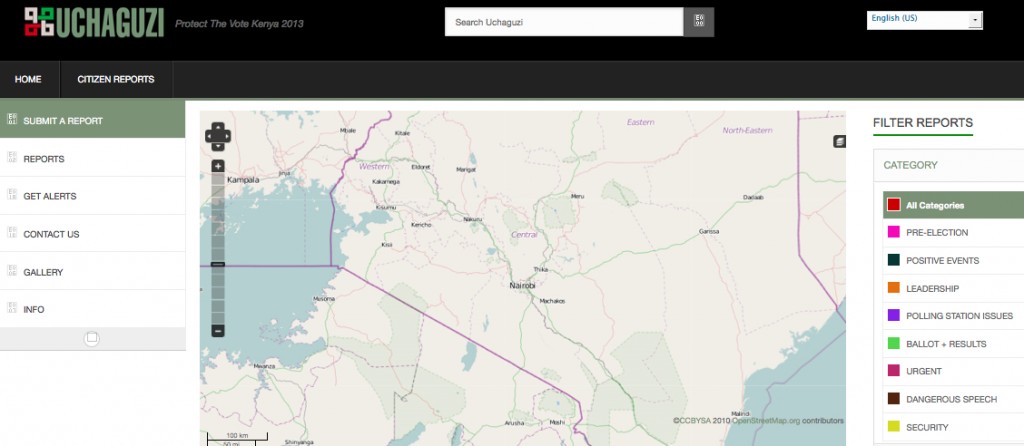Ushahidi launches Uchaguzi for free, fair and peaceful elections in Kenya
Kenyans go to the polls for the country’s general elections on Monday, March 4. However, any repetition of the post-election violence that followed the 2007 elections is a major concern.
Ushahidi is an open source platform that was initially developed to map and monitor reports of violence in Kenya after the 2007 elections. Ushahidi gained a lot of attention for the innovative way it was able gather reports from citizens by SMS and the web and visualize those reports on a map. It’s since been used in countries such as DRC, India and by broadcasters such as Al Jazeera. In the lead up to this year’s election, the Ushahidi team has launched a new version: Uchaguzi – which is the Kiswahili word for elections.
If you take a closer look at the categories for reports, the events or incidences the platform will document include: pre-election, positive events, leadership, polling station issues, ballot and results, urgent, dangerous speech and security.
To find out more about Uchaguzi, DW Akademie’s Christine Harjes spoke with project leader Daudi Were.
You’ve used Ushahidi during the post election violence in 2008. What’s new about Uchaguzi?
Uchaguzi is a more enhanced version of the Ushahidi platform. Basically, the aim of Uchaguzi is to have free, fair, peaceful and credible general elections. Our strategy for that is to increase transparency and accountability by having citizens at the heart of the process. We are using two tools to achieve this: the first tool is the partnerships. We’ve been building partnerships with grassroots organizations at a very local level for the last two years. Uchaguzi itself has partnerships with four key organizations: SODNET, CRECO, the Hivos Foundation and Ushahidi.
The second tool we use is the platform which is uchaguzi.co.ke that’s built on the Ushahidi software. So, the main difference between 2008 and now is that we’ve built the partnerships in advance – well ahead of the crisis; we’re trying to avert the crisis whereas in 2008 we started in the middle of the crisis and we were chasing the crisis. This time we’re deployed in advance and hopefully that will make us stronger.
Where’s the technical difference between the two platforms?
Uchaguzi is a much enhanced and much upgraded version of the Ushahidi platform. There’s a lot of improvements around how people can collaborate in the back-end. We divided ourselves into eight digital teams. Each of the digital teams have a very specific work-flow, and around those work-flows there are some features on the platform that make it easier to work together in the back-end.
You’ve mentioned the importance of citizens’ participation. Is mainstream media failing in their election coverage in Kenya?
Not really failing. I think there are a lot of avenues for us to work together. We have regular media events teaching journalists how to get stories out of the reports that they are seeing [on the platform[. There’s lots of room for cooperation with the mainstream media. However, the mainstream media usually look for the big picture. The power of Uchaguzi is that it allows us to amplify the single voice of a citizen to a point where it can have a very positive impact on the entire electoral process. There are things the mainstream media does better and there are things which Uchaguzi can do better.
Compared to other African countries, connectivity in Kenya is quite high. Still, a large number of people don’t have internet access. How do you bring Uchaguzi to the people?

Daudi Were
At Ushahidi we always say we meet you where you are. Whatever technology you have available in your hand – we can meet you there. You don’t have to buy any new technology, you don’t have to learn any new skills, to interact with our platform. For this election the number one method of communication is SMS to the short code 3002. The people on the ground, the ordinary citizen, penetrate the Uchaguzi platform purely through SMS. They can send their reports by sms and they can receive alerts by SMS. However, if you have an iPhone or an Android phone you can use the app, if you have internet access you can go to the website, if you’re on social media, on Twitter, Facebook, you can visit our Twitter-profile and the Facebook homepage
Ushahidi was founded to monitor the post election violence in 2008. Do you expect violence to break out again?
What I can say is that there are a lot more people working for peace than there are working for violence. Many, many Kenyans are sitting everyday in meetings working for peace. The key is we have to stay united. The organizations and the individuals that are working for peace have to stay united. We have to have a joint strategy and that’s what we’ve been working on. There may be violence but I’m pretty sure that there are many more of us working for peace.
Ushahidi is being used all over the world. Is Uchaguzi applicable in other countries as well?
Oh yeah! Since we’ve launched Ushahidi in 2008 it has been used 4.000 times in 159 countries. Ushahidi software has got a global reach. It’s been used for the last general election in the US, in Nigeria, the DRC, India… With the Uchaguzi partnership we had our pilot with the referendum in 2010, but since than we’ve done the general elections in Uganda, Tanzania, and Zambia.
Are you a citizen reporter or a journalist using Uchaguzi during the Kenyan elections? Tell us about your experience of using the platform – make a comment below or on the DW Akademie Africa Facebook page.






Feedback